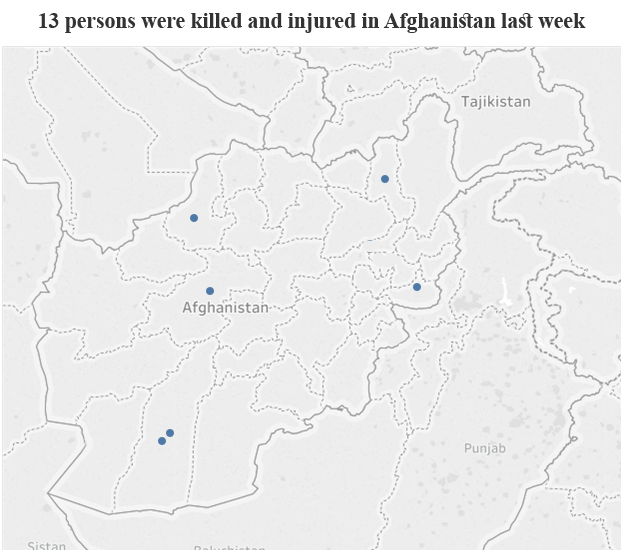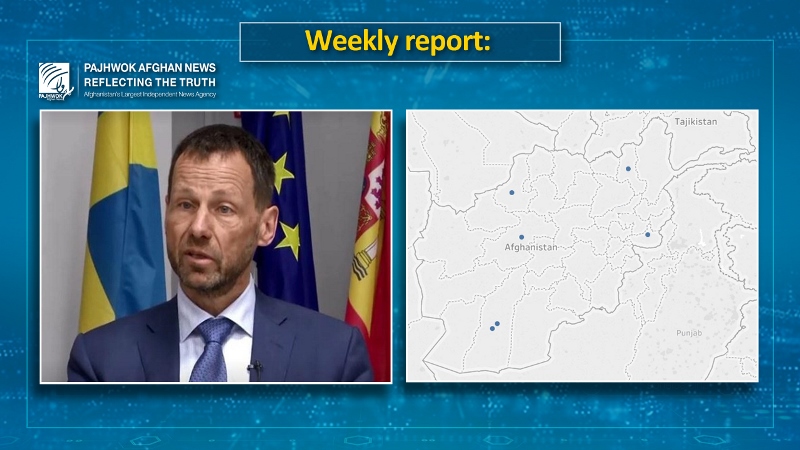KABUL (Pajhwok): The United Nations last week accused the caretaker government of Afghanistan of being repressive towards all forms of opposition and Russia said the government in Kabul was not broad-based, but the Islamic Emirate spokesman rejected these claims as baseless.
Last week’s major events
- UNSC report says Taliban revert to 1990s policies
- Kabulov: Current Afghan government not broad-based
- Bennett: Taliban use extreme forms of gender-based discrimination
- EU: National dialogue needed for women in social life
- Bilawal: World should interact with Afghan interim govt
Casualties
Last week, four people were killed and nine others were injured in various incidents across the country.
Unidentified gunmen killed a student in Takhar and a young man in Faryab and a person who had personal enmity was killed in Nangarhar.

Note: These figures are based on reports reaching Pajhwok Afghan News. Some incidents may have gone unreported or officials provided incorrect figures.
In the previous week, 30 people were killed and more than 35 were injured in various incidents across the country.
Before the regime change in 2021, hundreds of civilians, insurgents and government forces would get killed and injured every week.
Criticism and Islamic Emirate’s response
Last week, the UNSC in a report, released earlier in June by the Analytical Support and Sanctions Monitoring Team, said the Taliban governance structures remained “highly exclusionary, Pashtun-centred and repressive” towards all forms of opposition.
It also said Kandahar’s return as the seat of power – like it was during the Taliban’s rule of Afghanistan in the 1990s – circumvents senior ministers in Kabul, the centre of the current government, because of the way decisions are made.
The report also said the group was battling internal conflict over key policies, the centralisation of power and the control of financial and natural resources in Afghanistan.
Ongoing power struggles are further destabilising the situation, to the point where an outbreak of armed conflict between rival factions is a manifest risk, the report added.
However, Islamic Emirate spokesman Zabihullah Mujahid rejected the report’s “accusations” of strife, saying they were baseless and demonstrated “obvious hostility” to Afghans.
Rumours of disagreement between the group’s leaders are a continuation of the propaganda of the past 20 years, he said, referring to the 20 years of US war and occupation.
“The publication of such biased and baseless reports by the Security Council does not help Afghanistan and international peace and security, rather, it increases worry among the people [Afghans].”
The UNSC report also said terrorist groups’ activities had increased in Afghanistan and Al-Qaeda had re-emerged and ISIS attacks also increased.
Russia
Russia’s special representative for Afghanistan, Zamir Kabulov, has said until the current Afghan rulers are recognized, their ambassador cannot work in the Afghan embassy in Russia.
Kabulov added that the current government of Afghanistan was not inclusive.
However, Mujahid called the issue of broad-based government internal matter of Afghanistan and assured foreign citizens that Afghanistan was safe.
Pakistan’s Foreign Minister Bilawal Bhutto Zardari has said interaction with the interim government of Afghanistan was the only solution for Afghanistan.
“Not only Pakistan but the entire world community should interact with the interim government of Afghanistan because it serves the interest of all of us that Afghanistan becomes a peaceful country and the interim government should fulfill its responsibilities towards the international community.”
Women’s rights
Last week, the European Union’s special representative for Afghanistan, Tomas Niklasson, who met a group of Afghan women, said that a national dialogue was needed for the protection of women’s rights and their participation in social life in Afghanistan.
Also, UN Special Rapporteur on the situation of human rights in Afghanistan, Richard Bennett, claimed that the caretaker government of Afghanistan was practicing “the most extreme forms of gender-based discrimination and censorship.”
However, Mujahid in response said neither facts had not been examined in this regard nor cultural, religious and Islamic values of Afghanistan.
“They think Afghanistan is like Western countries, they say things about women’s rights as they want in the West, but this is not the case in Afghanistan.”
ma







GET IN TOUCH
NEWSLETTER
SUGGEST A STORY
PAJHWOK MOBILE APP